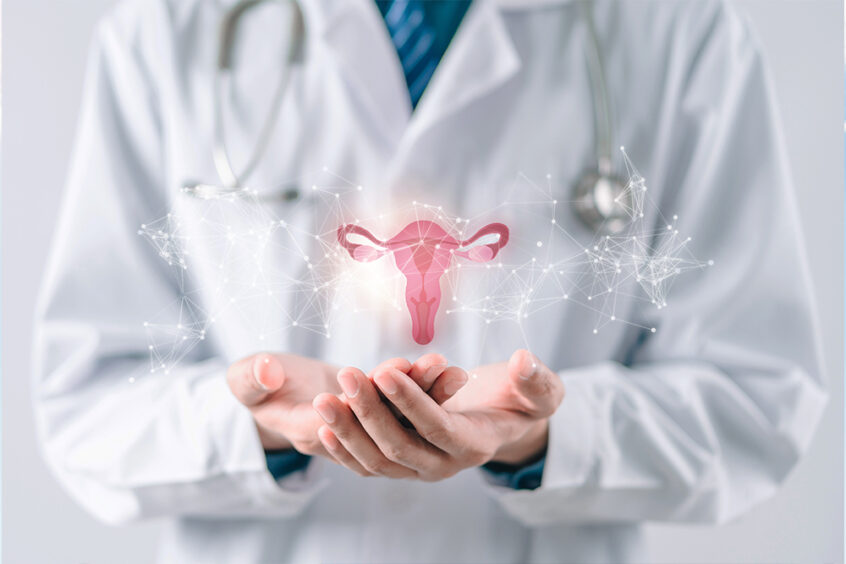Menopause Symptoms

Usually at a time when many women are experiencing some of the most challenging transitions in their life, such as caring for aging parents or preparing their children to go off to college, they are also physically dealing with the symptoms of menopause.
As with most transitions, menopause can bring new challenges and concerns, but with a few simple changes and the help of a caring physician like Dr. Fliedner, a woman can turn menopause into a time of growth and commitment to improved health.
In this article we are going to help ease your concerns about this natural transition by answering the following questions:
- What is menopause?
- What are the signs and symptoms of menopause?
- Best practices for treating menopause symptoms
- Finding the right menopause specialist
What is menopause?
Menopause is when your period permanently stops.
It is the natural biological process that marks the end of a woman’s reproductive years. It occurs when a woman’s ovaries stop producing eggs and her menstrual periods cease permanently. Menopause is usually a gradual process that occurs over several years, with a transition period known as perimenopause, during which a woman’s hormone levels, particularly estrogen and progesterone, start to fluctuate and eventually decrease.
The average age of menopause in women is around 51, but it can occur anywhere between the late 40s and early 60s. Once a woman has gone without a menstrual period for 12 consecutive months, she is considered in menopause.
While menopause is a natural part of the aging process, women experience it quite differently depending on their health history, diet, and other factors. Many have found hormone replacement therapy (HRT), exercise regimes, and diet changes to be great approaches to alleviating menopausal symptoms.
Finding the right hormone specialist is the first step to providing relief. The first appointment will involve discussing your health history and any menopause symptoms, and taking a blood test to discover your hormone and mineral levels. After reviewing your various hormone and mineral levels, your specialist and you can develop a custom plan to address your hormonal imbalances and improve your overall health. The plan will include exercise, diet, vitamins, minerals and hormones – all that your body needs to be its best.
What are the signs and symptoms of menopause?
The first signs of menopause often begin during a phase called perimenopause, which is the transitional period leading up to menopause itself. Perimenopause can start several years before menopause and is characterized by hormonal fluctuations that can cause various symptoms. You may be transitioning into menopause if you begin experiencing some or all of the following symptoms listed below:
- Hot Flashes and Night Sweats: Also known as vasomotor symptoms, a sudden feeling of warmth that spreads over your body, these sudden, intense feelings of heat are often accompanied by sweating and flushing of the skin. When people think of women transitioning, hot flashes most come to mind.
- Irregular Menstrual Periods: As you approach menopause, your menstrual cycles may become irregular, with periods becoming lighter, heavier, longer, or shorter. This is nothing to be worried about, but when you first notice any of these changes to the rhythm of your cycle, make an appointment with your OB-GYN. This is a great step to prepare for menopause – the eventual end of your periods. 🙂
- Vaginal Changes: Decreased estrogen levels can lead to vaginal atrophy, a condition where the lining of your vagina gets drier and thinner. This results in itching, burning and pain during sex, among other symptoms. The condition also can include urinary tract problems such as urinary tract infections (UTIs) and urinary incontinence.
- Difficulty Sleeping: “Poor sleep quality and sleep disturbances are lesser-known changes during this phase of life,” says Dr. Thomas Fliedner, “but they’re very common.” Insomnia and other sleep disturbances occur during menopause, triggered by night sweats or other hormonal changes affecting sleep patterns.
- Mood Changes: Many women experience mood swings, irritability, anxiety, and mild depression during menopause due to hormonal fluctuations.
- Changes in Libido: Some women may notice a decrease in their sex drive or changes in sexual response due to hormonal changes and vaginal discomfort. According to an article in The Permanente Journal, “women can experience decreases in both libido, orgasm, and frequency of coitus — most commonly because of physiologic changes due to menopause, less commonly due to depression or marital discord.”
- Fatigue: Feelings of fatigue or low energy levels can be common during menopause. Dr. Fliedner says that falling estrogen levels contribute to night sweats which disrupt sleep and contribute to fatigue and a lack of energy.
- Difficulty Concentrating and Memory Changes: Research into menopause shows that memory and information processing can be affected by changes in hormone levels. It is likely that treatments that lower estrogen levels or block the action of estrogen may affect your ability to think. They may also affect your concentration and ability to remember things. (Cancer Research UK )
- Changes in Hair and Skin: Menopause can lead to thinning hair, changes in hair texture, and changes in skin elasticity and texture.
- Urinary Symptoms: Some women experience increased urinary frequency, urgency, or leakage due to changes in the urinary tract lining and pelvic floor muscles.
- Joint and Muscle Pain: Joint and muscle pain, often resembling arthritis, can occur during menopause. Because estrogen receptors exist all over the body, including the joints, declining hormone levels can add to pain caused by inflammation, general wear and tear, and just plain aging.
- Weight Gain: Some women might experience weight gain or changes in body composition, particularly around the belly. It may seem minor and an inconvenience, but excess belly weight signals other health issues and women would be wise to get with their menopause specialist to develop a health regimen to trim down the belly fat. According to the Mayo Clinic, “a waist measurement of more than 35 inches (89 centimeters) signals an unhealthy amount of belly fat and a greater risk of other health problems.”
Best practices for treating menopause symptoms
The treatment options for menopause symptoms vary depending on the severity of your symptoms, your overall health, and your personal preferences. With so many options available to women today, we recommend you consult with a menopause specialist such as Dr. Fliedner to determine the treatment approach best for you.
Dr. Fliedner has made his life’s work treating the whole person. As each of our bodies is unique, he will test, listen to you describe any symptoms, and learn your family health history to prescribe a personal program aimed at treating your symptoms. He may suggest various therapies, hormones, or medications. Below are some common treatment options he may prescribe for managing menopause symptoms:
- Lifestyle Changes: Making simple, healthy lifestyle changes can have a positive impact on managing menopause symptoms. These may include maintaining a balanced diet, staying physically active, getting enough sleep, managing stress, and avoiding smoking and excessive alcohol consumption.
- Bioidentical Hormone Replacement Therapy (BHRT): BHRT involves taking estrogen alone or in combination with progestin (for women with a uterus) to supplement the declining hormone levels during menopause. BHRT is very effective at relieving hot flashes, vaginal dryness, and other symptoms. Dr. Fliedner will test to see if you are a candidate for BHRT.
- Non-Hormonal Prescription Medications: Some medications, such as selective serotonin reuptake inhibitors (SSRIs) or serotonin-norepinephrine reuptake inhibitors (SNRIs), commonly used as antidepressants, can also help manage symptoms like hot flashes and mood swings.
- Vaginal Estrogen: For some women experiencing vaginal dryness and discomfort, vaginal estrogen creams, rings, or tablets can help restore moisture and relieve symptoms locally.
- Herbal Remedies and Supplements: Some herbal supplements like black cohosh, soy, and red clover have been suggested to alleviate menopause symptoms. However, evidence for their effectiveness is mixed, and it’s important to discuss their use with your healthcare provider to ensure they are safe and appropriate for you.
- Cognitive Behavioral Therapy (CBT): CBT is a type of therapy that can help manage mood symptoms and improve coping strategies for the emotional changes that may accompany menopause. Contact our office to learn more about this therapy.
- Acupuncture and Other Alternative Therapies: Some women find relief from menopause symptoms through alternative therapies like acupuncture, mindfulness, and yoga. While the evidence is limited, these approaches may still offer some benefits and can be explored if you’re interested.
- Regular Health Checkups: Regular checkups with your healthcare professional are important to monitor your overall health and assess any hormonal changes due to menopause. These visits allow him the opportunity to continually test treatment effectiveness and make any adjustments to your plan as needed.

Finding the right menopause specialist
If you are experiencing perimenopausal symptoms, reach out to Dr, Fliedner and his trained staff at North Texas Vitality to support you during this transition and to prescribe therapies that improve overall health.
For over 30 years, Dr. Thomas Fliedner has followed his passion for learning, teaching, and treating men and women using the proven scientific methods of bioidentical hormone replacement therapy. He is always excited to see the life-changing improvements in his patients as a result of hormone therapy.
Dr. Fliedner is a Board-certified OB-GYN, and is associated with the following professional organizations:
- American College of Obstetricians and Gynecologists (ACOG)
- The North American Menopause Society (NAMS)
- Institute of Functional Medicine (IFM)
- BioTE Medical Certified Provider
- American Academy of Anti-Aging Medicine (A4M)
- Age Management Medicine Group (AMMG)
- International Society for Sexual Medicine (ISSM)
- Texas Medical Association (TMA)
- American Medical Association (AMA)
To request an appointment with Dr. Fliedner, call our office at (469) 455-1665 or fill out the form below.
